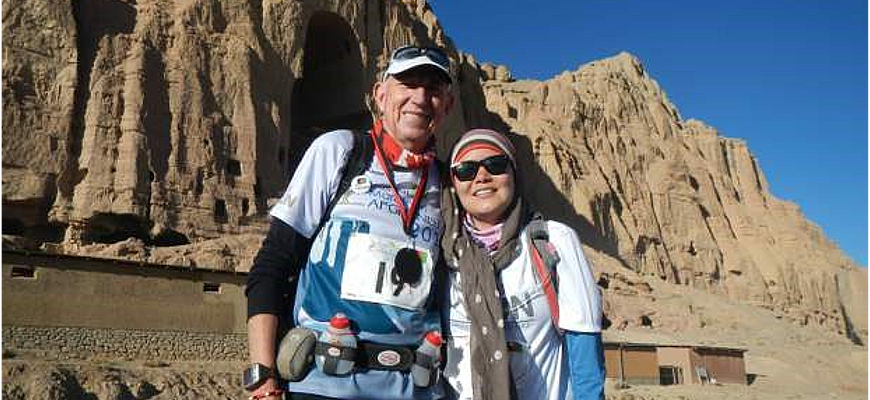14 Nov
2016
Afghanistan’s running women: The racers who made a statement in the world’s most secret marathon
Blog Editor
1452
Canadian Association of Professional Speakers
,
CAPS
,
Marathon of Afghanistan
,
Martin Parnell
,
Secret Marathon
,
Speaker
0 Comments
For Canada’s Marathon Man, Martin Parnell, it was the best time to record his worst time.
For almost seven long, gruelling hours, he had coaxed, pushed and encouraged a young Afghan woman to complete the 42-kilometre regulation distance that made up the world’s most secret marathon. When the pair crossed the finish line with only eight minutes to spare before the official cutoff time, it was the end of an eye-opening international odyssey for the 60-year-old runner from Cochrane, Alberta.
For a man who became famous across Canada by completing 250 marathons in a single year, and has raised more than $1.3 million for the Right To Play international charity, his finishing time was actually the worst he had ever clocked. But the joy on the face of the 25-year-old Afghan woman made such a detail irrelevant.
“There was never a better time to set my worst-ever time,” said Parnell, now back in Alberta after his secretive journey this month.
The second Afghanistan Marathon was staged in Bamiyan, a town of 35,000 about 140 km northwest of the capital, Kabul. Parnell and nine other international runners quietly slipped into the war-torn country two weeks ago to help organize and advise the 60 novice long-distance runners. The Nov. 4 race included five Afghan women who raced alongside the male competitors.
The race, which took place in Bamiyan, a town about 140 kms northwest of the capital Kabul, was kept super-secret, because last year locals tried to stone a women running in it.
The pre-race secrecy about the timing and location was vital, said Parnell, as the Taliban insurgents in Afghanistan are a constant deadly threat — particularly when women dare to take part alongside men.
“The five local women who took part this year are the new leaders who are stepping outside the norm. They are making a statement by using the marathon as a vehicle to show they are going to do what they need to do and they are not going to be stopped,” said Parnell.
More than a year ago, Parnell himself was almost stopped in his tracks when doctors discovered a blood clot in his brain. It was while recovering from treatment he heard about the inaugural Afghan marathon and how the first female runner to take part — Zainab — had been stoned and called a prostitute while training.
“It was then I made a vow: if I could recover in time, I would run the 2016 Marathon of Afghanistan and support Zainab’s efforts to show that sport is for everyone,” said Parnell.
Parnell took part to raise money for Right to Play.
He did recover. On Oct. 26, he met up in Kabul with a few other international runners from Britain, the Netherlands and the United States before flying to Bamiyan. They couldn’t drive to the town because the road was often mined.
Bamiyan was chosen specifically because the people who lived there have suffered from Taliban violence and are considered some of the most liberal in the country.
Before the race, Parnell spoke with town elders, asking whether they had concerns about the women running alongside men.
“Many of these older men had big families, some with four or five daughters. They said, ‘No, we want our daughters to get educated, to get on in the world. We want them to run,’ ” he said.
Travelling with Parnell was fellow Albertan, Kate McKenzie, a former teacher from Red Deer, who now works as a filmmaker. She planned to run the 42 km and produce a documentary of the event with a two-man crew from Toronto.
McKenzie and the other female international runners, along with the five local women, wore the traditional hijab. In total, 70 runners turned up for the 8 a.m. starting gun.
It would be an out and back course on mostly paved roads, reaching the turnaround (halfway) point at a daunting altitude of 2,740 metres. But Parnell’s race plan was set aside before the event even began when he met Kubra, a 25-year-old Afghan woman.
She had tried before to run a long-distance event but had collapsed without finishing. She had also recently lost friends when the Taliban had blown up the university in Kabul where she studied. And when she trained by running through the streets of Kabul, there would be gauntlets of jeering men.
“They would yell names at her and one man got off his bike and tried to push her over. So she took some action and bought a can of purple spray paint and a set of knuckle-dusters — ‘Enough of this I’m going to run,’ she decided. What an attitude,” said Parnell.
By the time of the marathon, Kubra hadn’t completed the necessary training regime. In the days before the race, Parnell tried to persuade her to do a 10-km event instead. The shorter race would take place in Bamiyan at the same time.
“But I thought, here is a young woman who has been dealt a tough hand, losing her friends in the bombing, so I decided then that the purpose of me going there was to help Kubra do this marathon, that if she wants to do a marathon then I’m going to help get her through it.
“The next day I gave a running clinic for the five Afghan women, talking about nutrition, hydration and pacing, and after the clinic I pulled her aside and said, ‘I’m willing to run with you.’ She was over the moon. So in the end I found my purpose — helping this brave, young woman complete her first marathon,” said Parnell.
Source – http://news.nationalpost.com/news/world/afghanistans-running-women-the-racers-who-made-a-statement-in-the-worlds-most-secret-marathon






